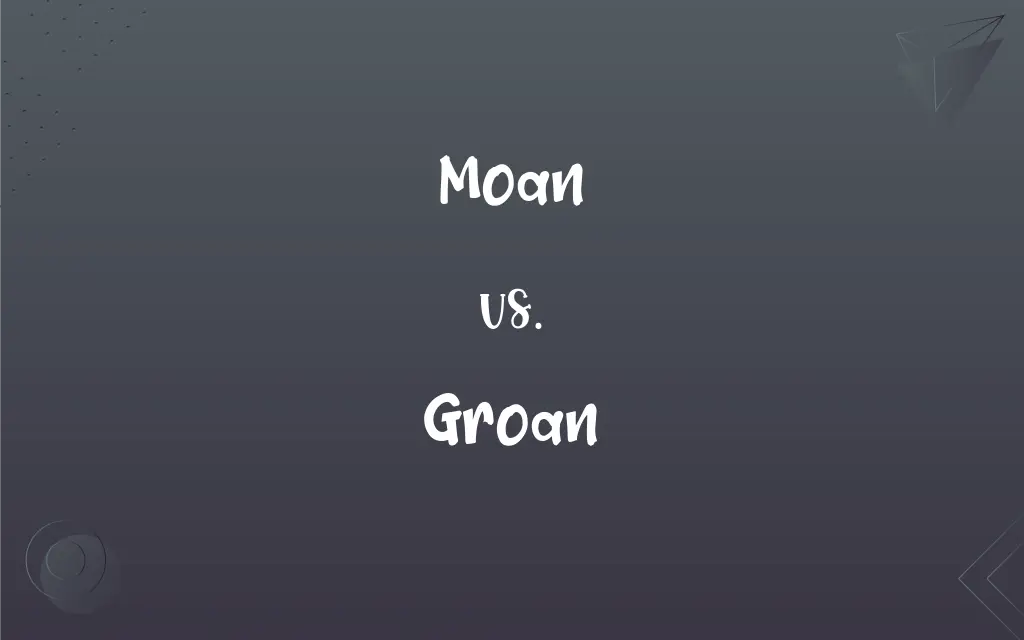Moan vs. Groan: What's the Difference?
Edited by Harlon Moss || By Janet White || Published on November 3, 2023
"Moan" refers to a prolonged, low sound indicating pain or pleasure, while "Groan" is a deep, inarticulate sound expressing discomfort or displeasure.

Key Differences
"Moan" and "Groan" are both vocal expressions, but they emanate from different emotions and circumstances. A "Moan" often has a more extended, sustained quality and can be an indicator of either pain or pleasure. For instance, someone might moan in relaxation during a massage.
Conversely, a "Groan" is typically shorter and is usually a direct response to discomfort, annoyance, or displeasure. If you lift something heavy and it strains your back, you might groan in response.
It's interesting to note that while both sounds can indicate pain, the context often helps determine the exact meaning. A "Moan" might be more ambiguous and can be seen in various contexts, from someone feeling unwell to someone expressing deep satisfaction. A "Groan," however, is more clearly tied to negative reactions, such as annoyance or the feeling of being burdened.
Both words can also be used metaphorically. For example, we might say the wind "moans" through the trees, suggesting a haunting, prolonged sound. On the other hand, if we say a house "groaned," it might suggest a short, creaking noise, perhaps indicative of the house settling or reacting to external forces.
In colloquial usage, "Moan" can also refer to complaints. For instance, "She always has a moan about the weather," implying she often complains. "Groan" in a similar context might suggest a more exasperated or weary kind of complaint, as in, "He groaned at the thought of another meeting."
ADVERTISEMENT
Comparison Chart
Meaning
A prolonged, low sound indicating pain or pleasure.
A deep sound expressing discomfort or displeasure.
Duration
Typically longer and more sustained.
Generally shorter and more abrupt.
Associated Emotion
Can be pleasure, pain, or dissatisfaction.
Typically discomfort, annoyance, or burden.
Metaphorical Use
Wind "moans" through trees.
House "groaned" under weight.
Colloquial Usage
Refers to complaints.
Indicates an exasperated or weary kind of complaint.
ADVERTISEMENT
Moan and Groan Definitions
Moan
A prolonged, low vocal sound.
The injured animal made a continuous moan.
Groan
A sound made in response to pain or strain.
He groaned lifting the heavy box.
Moan
A vocal expression of pleasure or satisfaction.
She moaned in delight tasting the dessert.
Groan
An expression of disapproval or annoyance.
She groaned hearing the bad joke.
Moan
The sound made by certain inanimate objects.
The wind moaned through the gaps.
Groan
The noise of something under pressure or strain.
The old floorboards groan when stepped on.
Moan
A sound of pain or discomfort.
He let out a moan after stubbing his toe.
Groan
A vocal sound indicating a burden or weight.
With every added task, she let out a groan.
Moan
A low, sustained, mournful cry, usually indicative of sorrow or pain.
Groan
A reaction to an undesirable situation.
The students groaned at the announcement of extra homework.
Moan
A similar sound
The eerie moan of the night wind.
Groan
To voice a deep, inarticulate sound, as of pain, grief, or displeasure.
Moan
A complaint
His tiresome moans about his boss.
Groan
To make a sound expressive of stress or strain
Floorboards groaning.
Moan
To utter a moan or moans.
Groan
To utter or express with groans or a groan.
Moan
To make a sound resembling a moan
A saxophone moaned in the background.
Groan
The sound made in groaning.
Moan
To complain, lament, or grieve
An old man who still moans about his misspent youth.
Groan
A low, mournful sound uttered in pain or grief.
Moan
To bewail or bemoan
She moaned her misfortunes to anyone who would listen.
Groan
A low, guttural sound uttered in frustration, disapproval, or ecstasy.
Moan
To utter with moans or a moan.
Groan
A low creaking sound from applied pressure or weight.
Moan
A low, mournful cry of pain, sorrow or pleasure
Let out a deep moan
We heard the distant moan of a stag in pain.
Groan
To make a groan.
We groaned at his awful jokes.
The wooden table groaned under the weight of the banquet.
Moan
To complain about; to bemoan, to bewail; to mourn.
Groan
(figurative) To seemingly creak under the strain of being heavily laden.
Moan
To grieve.
Groan
(obsolete) To strive after earnestly, as if with groans.
Moan
(intransitive) To make a moan or similar sound.
She moaned with pleasure and squirmed with delight from receiving oral sex.
Groan
To give forth a low, moaning sound in breathing; to utter a groan, as in pain, in sorrow, or in derision; to moan.
For we . . . do groan, being burdened.
He heard the groaning of the oak.
Moan
(transitive) To say in a moan, or with a moaning voice.
‘Please don't leave me,’ he moaned.
Groan
To strive after earnestly, as with groans.
Nothing but holy, pure, and clear,Or that which groaneth to be so.
Moan
To complain; to grumble.
Groan
To affect by groans.
Moan
To distress (someone); to sadden.
Groan
A low, moaning sound; usually, a deep, mournful sound uttered in pain or great distress; sometimes, an expression of strong disapprobation; as, the remark was received with groans.
Such groans of roaring wind and rain.
The wretched animal heaved forth such groans.
Moan
To make a low prolonged sound of grief or pain, whether articulate or not; to groan softly and continuously.
Unpitied and unheard, where misery moans.
Let there bechance him pitiful mischances,To make him moan.
Groan
An utterance expressing pain or disapproval
Moan
To emit a sound like moan; - said of things inanimate; as, the wind moans.
Groan
Indicate pain, discomfort, or displeasure;
The students groaned when the professor got out the exam booklets
The ancient door soughed when opened
Moan
To bewail audibly; to lament.
Ye floods, ye woods, ye echoes, moanMy dear Columbo, dead and gone.
Moan
To afflict; to distress.
Which infinitely moans me.
Moan
A low prolonged sound, articulate or not, indicative of pain or of grief; a low groan.
Sullen moans, hollow groans.
Moan
A low mournful or murmuring sound; - of things.
Rippling waters made a pleasant moan.
Moan
An utterance expressing pain or disapproval
Moan
Indicate pain, discomfort, or displeasure;
The students groaned when the professor got out the exam booklets
The ancient door soughed when opened
Moan
A complaint or grievance.
She always has a moan about the weather.
FAQs
Can "Moan" ever be positive?
Yes, someone might moan in pleasure or satisfaction.
Is "Groan" mostly negative?
Typically, it suggests discomfort, annoyance, or burden.
Can inanimate objects "Moan" or "Groan"?
Yes, metaphorically, like the wind moaning or a house groaning.
Can both words indicate a complaint?
Yes, but "Moan" is more directly associated with complaints, while "Groan" suggests a wearier complaint.
Are "Moan" and "Groan" synonyms?
While similar, they are not exact synonyms. "Moan" can indicate pleasure or pain, while "Groan" usually suggests discomfort.
Can you "Groan" at a joke?
Yes, if it's bad or punny, one might groan in response.
Is a "Moan" usually longer than a "Groan"?
Typically, a "Moan" is more prolonged, while a "Groan" is shorter.
Which word is more versatile in meaning?
"Moan" has a broader range, from pain to pleasure to complaints.
Can a "Groan" be quiet?
Typically, it's audible but can be soft.
Is a "Moan" always loud?
No, it can be quiet or loud depending on the context.
Are these words verbs or nouns?
Both can be used as verbs or nouns.
Is a "Moan" always vocal?
Typically, but it can also describe non-vocal sounds like wind.
Can "Groan" indicate physical strain?
Yes, like when lifting something heavy.
Can animals "Moan" or "Groan"?
Yes, animals can make such vocalizations, especially when in distress or comfort.
Can "Groan" be used to describe machinery?
Yes, like a machine straining under load might "Groan."
Is a "Groan" deeper in pitch than a "Moan"?
It's often perceived that way, but context and individual interpretation can vary.
Is "Moan" more ambiguous than "Groan"?
Generally, as it can indicate various emotions from pleasure to pain.
Which word is more likely associated with sound?
Both are, but "Moan" might be more associated with continuous sounds.
How do I know when to use "Moan" or "Groan"?
Consider the emotion or reaction you're trying to convey; pleasure or ambiguous pain might lean towards "Moan," discomfort or annoyance towards "Groan."
Are these words used in everyday language?
Yes, both are commonly used in various contexts.
About Author
Written by
Janet WhiteJanet White has been an esteemed writer and blogger for Difference Wiki. Holding a Master's degree in Science and Medical Journalism from the prestigious Boston University, she has consistently demonstrated her expertise and passion for her field. When she's not immersed in her work, Janet relishes her time exercising, delving into a good book, and cherishing moments with friends and family.
Edited by
Harlon MossHarlon is a seasoned quality moderator and accomplished content writer for Difference Wiki. An alumnus of the prestigious University of California, he earned his degree in Computer Science. Leveraging his academic background, Harlon brings a meticulous and informed perspective to his work, ensuring content accuracy and excellence.






































































